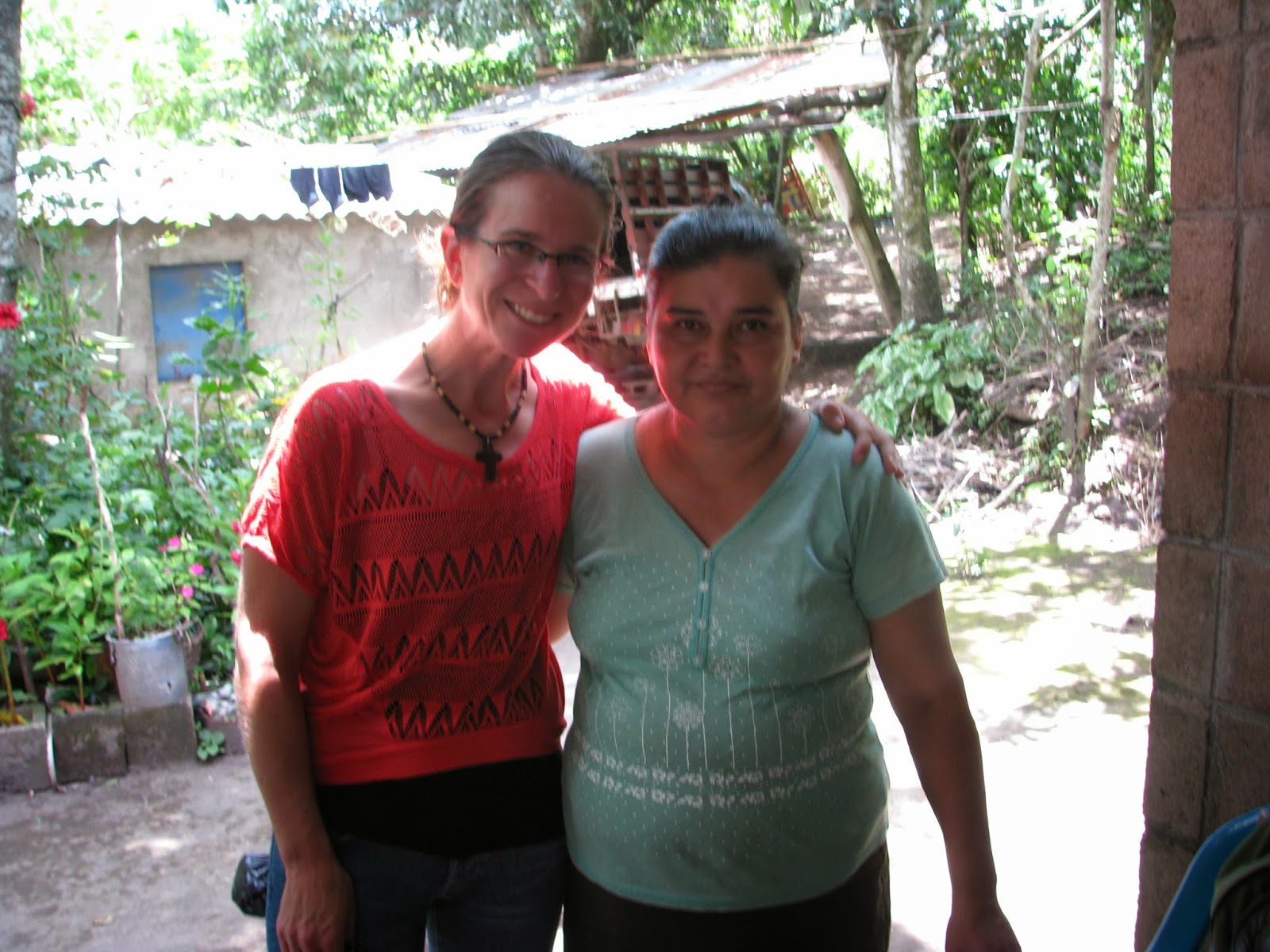I am going to share some facts that were shared with me regarding cost of living and a little bit about the social reality in El Salvador. A family of four, just for food, needs approximately $170/month. Textile and factory workers make approximately $190/month. Farm workers make approximately $100/month. Those with professional degrees make between $600-$700/month. For a family of four to have a modest living they would need to make about $700/month. 80% of all earnings goes towards commercial buys - such as clothes, food, and rent. The other 20% goes towards healthcare and education. Many families are single parent homes.
 |
| Me with a mom of a scholarship student. |
Yet there is so much hope in Las Delicias! Here we visited one of the Maryknoll Lay Missioners sites. Larry, the missioner works with FUDESCA: Fundación para el Desarrollo y la Solidaridad Cástulo Antonio (FUDESCA). This organization works on several projects, some of which include, scholarships for youth attending elementary and high schools and young adults attending college, soccer teams - where their motto is Dios, Estudios y Deportes, computer classes, a small library is accessible to youth to read and study, jewelry making, art classes, and even a break-dancing team! I was struck by the diversity of the programs for the youth. Since gangs infest the streets of El Salvador it is necessary that children have healthy and life-giving alternatives - such as school and activities, like those provided by FUDESCA. While there are barriers to overcome the poverty I saw in Las Declicas, I truly felt a sense of hope visiting this small community.
 |
| With children in La Esperanza. |
I know we all left with heavy hearts because we know that many of these children face terrible odds of overcoming the barriers that hold them back. This community moved my heart. These children changed my soul. One cannot see this reality and come back the same person. Tonight as I was driving home and was talking to my dad on my cell phone I told him - I am too comfortable. I said, "Papi, I just drove 60 miles - back and forth to work - how can I be okay with this when the children in El Salvador do not have access to go to a school that is 20 miles away from them?" While I am unsure of where this experience is going to lead me and my family, I know, in the depths of my heart that I am not the same person I was before I left to El Salvador.
In 2011 the Universidad de Centro America (UCA), a university run by the Jesuits in El Salvador, did a study asking the question, is El Salvador a country for youth? The study concluded that due to the gang prevalence and violence, it is not. I did learn, however, that there has been some strides of success in disarming the violence created by gangs in El Salvador. Time magazine highlights a truce that has been made between two of the most powerful gangs in El Salvdor in an article written in 2012 (Gang Truce). The sense that I got was that some people believe the truce is working because homicides in certain regions have lowered. People are grateful that the truce - not more violence - is actually lowering the number of deaths. However, some people are very skeptical that the truce is actually working. They believe that the reports on the numbers of homicides are skewed.
Overall I am left with more questions than answers. What is my role? What can I do? I received an email from Rick a few days ago with two notes from two children in his community asking me to write a letter and send pictures to them. I knew, without thinking, that I was going to respond to these children. Besides my long distance love of the children of El Salvador - what else am I called to do? How am I being called to share the story of the children of El Salvador?
Overall I am left with more questions than answers. What is my role? What can I do? I received an email from Rick a few days ago with two notes from two children in his community asking me to write a letter and send pictures to them. I knew, without thinking, that I was going to respond to these children. Besides my long distance love of the children of El Salvador - what else am I called to do? How am I being called to share the story of the children of El Salvador?





No comments:
Post a Comment